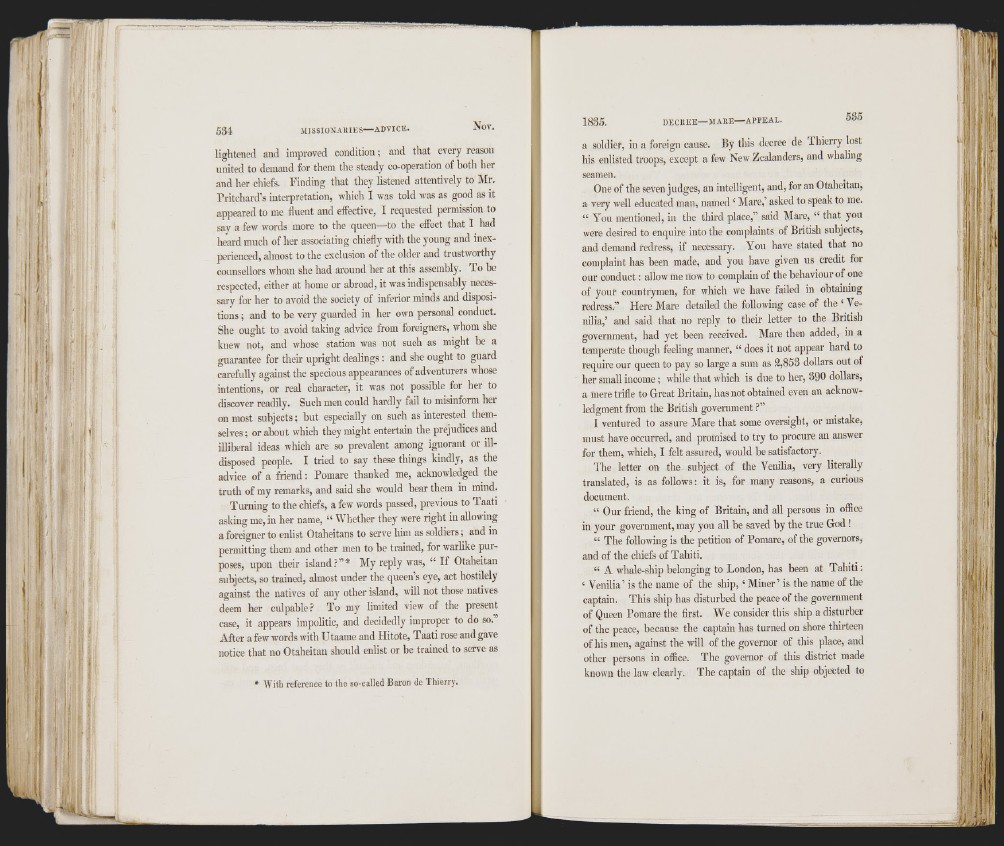
fÍ jli ■ .
ii ; ; i r I
i.
MISSIONARIES ADVICE.
lightened and improved condition; and that every reason
united to demand for them the steady co-operation of both her
and her chiefs. Finding that they listened attentively to Mr.
Pritchard’s interpretation, which I was told was as good as it
appeared to me fluent and effective, I requested permission to
say a few words more to the queen—to the effect that I had
heard much of her associating chiefly with the young and inexperienced,
almost to the exclusion of the older and trustworthy
counsellors whom she had m'ound her at this assembly. To be
respected, either at home or abroad, it was indispensably necessary
for her to avoid the society of inferior minds and dispositions
; and to be very guarded in her own personal conduct.
She ought to avoid taking advice from foreigners, whom she
knew not, and whose station was not such as might be a
guarantee for their upright dealings : and she ought to guard
carefully against the specious appearances of adventurers whose
intentions, or real chai-acter, it was not possible for her to
discover readily. Such men could hardly fail to misinform hei
on most subjects; but especially on such as interested themselves
; or about which they might entertain the prejudices and
illiberal ideas which are so prevalent among ignorant or ill-
disposed people. I tried to say these things kindly, as the
advice of a friend: Pomare thanked me, acknowledged the
truth of my remarks, and said she would bear them in mind.
Turning to the chiefs, a few words passed, previous to Taati
asking me, in her name, “ Whether they were right in allowing
a foreigner to enlist Otaheitans to serve him as soldiers; and in
permitting them and other men to be trained, for warlike purposes,
upon their island?” * My reply was, “ If Otaheitan
subjects, so trained, almost under the queen’s eye, act hostilely
against the natives of any other island, will not those natives
deem her culpable? To my limited view of the present
case, it appears impolitic, and decidedly improper to do so.
After a few words with Utaame and Hitóte, Taati rose and gave
notice that no Otaheitan should enlist or be trained to serve as
* With reference to the so-called Baron de Thierry.
a soldier, in a foreign cause. By this decree de Thierry lost
his enlisted troops, except a few New Zealanders, and whaling
seamen.
One of the seven judges, an intelligent, and, for an Otaheitan,
a very well educated man, named ‘ Mare,’ asked to speak to me.
“ You mentioned, in the third place,” said Mare, “ that you
were desired to enquire into the complaints of British subjects,
and demand redress, if necessary. You have stated that no
complaint has been made, and you have given us credit for
our conduct: allow me now to complain of the behaviour of one
of your countrymen, for which we have failed in obtaining
redress.” Here Mare detailed the following case of the ‘ Venilia,’
and said that no reply to their letter to the British
government, had yet been received. Mare then added, in a
temperate though feeling manner, “ does it not appear hard to
require our queen to pay so large a sum as 2,853 dollars out of
her small income; while that which is due to her, 390 dollars,
a mere trifle to Great Britain, has not obtained even an acknowledgment
from the British government ?”
I ventured to assure Mare that some oversight, or mistake,
must have occurred, and promised to try to procure an answer
for them, which, I felt assured, would he satisfactory.
The letter on the subject of the Venilia, very literally
translated, is as follows: it is, for many reasons, a curious
document.
“ Our friend, the king of Britain, and all persons in office
in your government, may you all be saved by the true God !
“ The following is the petition of Pomare, of the governors,
and of the chiefs of Tahiti.
“ A whale-ship belonging to London, has been at Tahiti:
‘ Venilia’ is the name of the ship, ‘ Miner’ is the name of the
captain. This ship has disturbed the peace of the government
of Queen Pomare the first. We consider this ship a disturber
of the peace, because the captain has turned on shore thirteen
of his men, against the will of the governor of this place, and
other persons in office. The governor of this district made
known the law clearly. The captain of the ship objected to